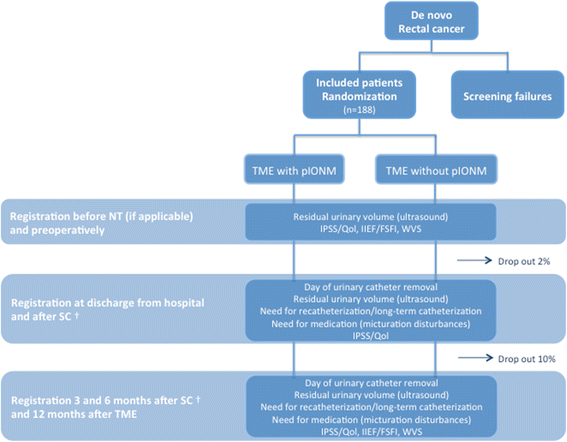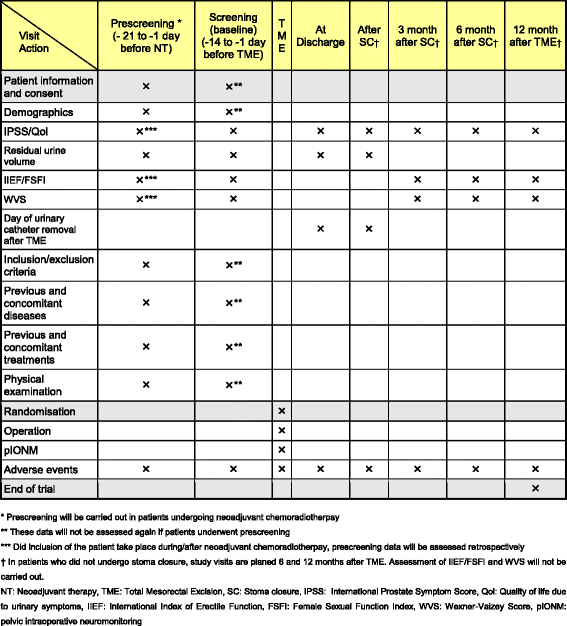Continuous intraoperative monitoring of pelvic autonomic nerves during TME to prevent urogenital and anorectal dysfunction in rectal cancer patients (NEUROS): a randomized controlled trial
- PMID: 27209237
- PMCID: PMC4875600
- DOI: 10.1186/s12885-016-2348-4
Continuous intraoperative monitoring of pelvic autonomic nerves during TME to prevent urogenital and anorectal dysfunction in rectal cancer patients (NEUROS): a randomized controlled trial
Abstract
Background: Urinary, sexual and anorectal sequelae are frequent after rectal cancer surgery and were found to be related to intraoperative neurogenic impairment. Neuromonitoring methods have been developed to identify and preserve the complex pelvic autonomic nervous system in order to maintain patients' quality of life. So far no randomized study has been published dealing with the role of neuromonitoring in rectal cancer surgery.
Methods/design: NEUROS is a prospective two-arm randomized controlled multicenter clinical trial comparing the functional outcome in rectal cancer patients undergoing total mesorectal excision (TME) with and without pelvic intraoperative neuromonitoring (pIONM). A total of 188 patients will be included. Primary endpoint is the urinary function measured by the International Prostate Symptom Score. Secondary endpoints consist of sexual, anorectal functional outcome and safety, especially oncologic safety and quality of TME. Sexual function is assessed in females with the Female Sexual Function Index and in males with the International Index of Erectile Function. For evaluation of anorectal function the Wexner-Vaizey score is used. Functional evaluation is scheduled before radiochemotherapy (if applicable), preoperatively (baseline), before hospital discharge, 3 and 6 months after stoma closure and 12 months after surgery. For assessment of safety adverse events, the rates of positive resection margins and quality of mesorectum are documented.
Discussion: This study will provide high quality evidence on the efficacy of pIONM aiming for improvement of functional outcome in rectal cancer patients undergoing TME.
Trial registration: Clinicaltrials.gov: NCT01585727 . Registration date is 04/25/2012.
Keywords: Autonomic nerves; Fecal incontinence; Intraoperative monitoring; Quality of life; Rectal cancer; Sexual dysfunction; Urinary dysfunction.
Figures


Similar articles
-
Is intraoperative neuromonitoring associated with better functional outcome in patients undergoing open TME? Results of a case-control study.Eur J Surg Oncol. 2013 Sep;39(9):994-9. doi: 10.1016/j.ejso.2013.06.004. Epub 2013 Jun 28. Eur J Surg Oncol. 2013. PMID: 23810330 Clinical Trial.
-
Electrophysiology-based quality assurance of nerve-sparing in laparoscopic rectal cancer surgery: Is it worth the effort?Surg Endosc. 2016 Oct;30(10):4525-32. doi: 10.1007/s00464-016-4787-z. Epub 2016 Feb 19. Surg Endosc. 2016. PMID: 26895916
-
Risk Factor Analysis for Newly Developed Urogenital Dysfunction after Total Mesorectal Excision and Impact of Pelvic Intraoperative Neuromonitoring-a Prospective 2-Year Follow-Up Study.J Gastrointest Surg. 2017 Jun;21(6):1038-1047. doi: 10.1007/s11605-017-3409-y. Epub 2017 Apr 4. J Gastrointest Surg. 2017. PMID: 28378317
-
Diagnostic accuracy of intraoperative pelvic autonomic nerve monitoring during rectal surgery: a systematic review.Tech Coloproctol. 2024 Dec 6;29(1):8. doi: 10.1007/s10151-024-03043-w. Tech Coloproctol. 2024. PMID: 39641828 Free PMC article.
-
Total mesorectal excision for rectal cancer with emphasis on pelvic autonomic nerve preservation: Expert technical tips for robotic surgery.Surg Oncol. 2015 Sep;24(3):172-80. doi: 10.1016/j.suronc.2015.06.012. Epub 2015 Jun 17. Surg Oncol. 2015. PMID: 26141555 Review.
Cited by
-
Fecal incontinence after total mesorectal excision for rectal cancer-impact of potential risk factors and pelvic intraoperative neuromonitoring.World J Surg Oncol. 2020 Jan 15;18(1):12. doi: 10.1186/s12957-020-1782-6. World J Surg Oncol. 2020. PMID: 31941505 Free PMC article.
-
Tools for fecal incontinence assessment: lessons for inflammatory bowel disease trials based on a systematic review.United European Gastroenterol J. 2020 Oct;8(8):886-922. doi: 10.1177/2050640620943699. Epub 2020 Jul 17. United European Gastroenterol J. 2020. PMID: 32677555 Free PMC article.
-
Intraoperative neuromonitoring in rectal cancer surgery: a systematic review and meta-analysis.Int J Colorectal Dis. 2021 Jul;36(7):1385-1394. doi: 10.1007/s00384-021-03884-z. Epub 2021 Mar 8. Int J Colorectal Dis. 2021. PMID: 33686464
-
Three-dimensional versus two-dimensional laparoscopic surgery for rectal cancer: better promote postoperative sexual and urinary function of a propensity-matched study.Am J Cancer Res. 2022 Jul 15;12(7):3148-3163. eCollection 2022. Am J Cancer Res. 2022. PMID: 35968332 Free PMC article.
-
Development and evaluation of a Japanese prediction model for low anterior resection syndrome after rectal cancer surgery.BMC Gastroenterol. 2022 May 13;22(1):239. doi: 10.1186/s12876-022-02295-w. BMC Gastroenterol. 2022. PMID: 35562665 Free PMC article.
References
-
- Haim N, Wexner SD. Rectal Cancer-Associated Urinary Dysfunction: a Review. Curr Bladder Dysfunct Rep. 2015;10:118–124. doi: 10.1007/s11884-015-0298-3. - DOI
-
- Kneist W. Erhaltung der autonomen Nerven bei TME; in Korenkov M, Germer CT, Lang H (eds): Gastrointestinale Operationen und technische Varianten, Springer-Verlag Berlin Heidelberg, ISBN-13 978-3-642-32258-7, 2013:367-381.
-
- Lange MM, Martz JE, Ramdeen B, Brooks V, Boachie-Adjei K, van de Velde CJ, Enker WE. Long-term results of rectal cancer surgery with a systematical operative approach. Ann Surg Oncol. 2013;20:1806–15. - PubMed
-
- Costanzi A, Rigamonti L, Mari GM, Miranda A, Crippa J, Berardi V, Maggioni D. A prospective video-controlled study of genito-urinary disorders in 35 consecutive laparoscopic TMEs for rectal cancer. Surg Endosc. 2015;29:1721–8. - PubMed
Publication types
MeSH terms
Associated data
LinkOut - more resources
Full Text Sources
Other Literature Sources
Medical

